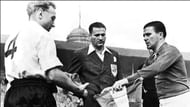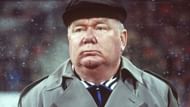Herbert Chapman
This year of all years, Arsenal fans would do good to remember the legacy of Herbert Chapman. The kits the gunners wear, whether it is the blue hoops on the sleeves or the WM inscribed on the back is in homage to him. I would go so far so as to call him the father of modern Arsenal. He turned the club around from relegation candidates and gave it its first extended period of dominance. Unlike the others on this list who were exponents of the total football theory, Chapman’s work involved creation of the center back position, the concept of flooding the midfield to help in attack and defense and using an ever present extra man to create quick breaks during counter attack. His successful implementation of these ideas revolutionized the English club game. It was the perfect tactic against the boring 2-3-5 that most clubs used then.

This image shows the W-M formation applied against the orthodox 2-3-5 formation (Dotted lines are defensive runs made by the players and complete lines are attacking runs made by the players)
The main points of the WM formation were
- While defending, Half Backs dropped deep and made it into a 5-man defense.
- Wingers were made fitter to enable tracking back and helping out the defense.
- Going forward as well, the Wingers were crucial. They took the ball to instigate the attack while the inside forwards made it a 5 man attack
- The half backs were the key in midfield domination; they had similar roles to that of today’s holding midfielders.
- The Center Back had to be good in the air in order to tackle long balls.
He also created the concept of stitching blue hoops on the socks and shirts to enable better player visibility; hence the 2012-13 kits have those very hoops. Even though he only won two league titles and a Fa cup at the helm, his ideas made the gunners the dominant team in the 1930s.
Jimmy Hogan
For those who follow international football today, England’s plight competition after competition is a well-documented affair. They have always had an array of stars but have not delivered. The seeds of England’s fall from the pinnacle of football were sown, quite surprisingly, by one of their own, Jimmy Hogan. With a story like something out of a movie, scoffed by his homeland Hogan went to Europe to propagate his coaching methods. He went everywhere from Switzerland, to Austria and all over Germany preaching a style which would eventually become total football. It bore fruit when Hungary came and in front of 100,000 shocked Englishmen, annihilating the English team 6-3 in Wembley. It was compounded when the President of the Hungarian FA said “Jimmy Hogan taught us all we know about football.”
- Pass and move was his ideology. In a rather Static football universe the superior movement on and off the ball that Hogan’s teams showed was revolutionary those days.
- Unlike the English who rarely trained on technical ability, Hogan believed that while talent was inherent, that skill with the ball could constantly be improved
- Worked on Chapman’s WM to enable better passing and movement and used it against the traditional WM with great success
- Showed the world the importance of tactics in football.
Though he did not have much success in terms of silverware, the quality of football we watch today is all thanks to this man.
Valeriy Lobanovski
If there was ever a man who could be called the father of total football, it would be Valeriy Lobanovski. Before the all-conquering Dutch manager Rinus Michaels had coined the term, Lobanovski of the Soviet Union had already a similar football ideology in place. He once said: “There is no such thing as a striker, a midfielder, a defender. There are only footballers and they should be able to do everything on the pitch.” Voila ‘total football’.
Much like the top teams of today, he stressed on cohesion and the inherent understanding between teammates. He had his methods to implement this, which involved rigorous practice of preset plays, much like American football. Players were made to practice drills thousands of times till it was seared into memory so much so that they were trained to perform them blindfolded.
- He emphasized on well-rounded players who could do everything rather than just men who did a particular role well
- He was the first, globally to use technology and statistics to analyze a player’s strengths and weaknesses.
- His penchant for discipline and the strictness of his methods were renowned in the Soviet to produce results, and they did.
- His teams produced a brand of football, shadows of which are seen in Barcelona and Arsenal today.
His success befitted his greatness. In his first spell at Dynamo, he led them to 6 leagues, 8 cups and two European trophies. He also has an Olympic Bronze medal to his name. The 1988 Euro was probably his greatest moment as the team reached the finals only to fall to a Dutch team who had perfected ‘Total football’. They fell prey to ‘that’ goal by Marco Van Basten. Heartbreaking!
He came back to Dynamo for a second time in 1997 to lead them to five more championships. He is to this day remembered in Russia as one of the greatest managers of all time.
Rinus Michels
“Total Football” (DUTCH: totaalvoetbal) is the label given to an influential tactical theory of association football in which any outfield player can take over the role of any other player in a team. It was invented by Rinus Michels, a famous Dutch football trainer/coach (who was the coach of both Ajax and the Netherlands national team at the time). That is what Wikipedia says about Rinus Michaels.
What they do not say is the profound impact this man had on football.
Few knew his name when he led Ajax in a European cup knockout match against Bill Shankly’s Liverpool. 6 goals later, nobody forgot his name. Michels took everything that Hogan had taught and perfected it in Ajax.
His Netherlands squad would become one of the greatest teams of all time, playing a game which bamboozled the best teams in the world. It was impossible for them to track attacks when every player could attack and defend. Michels had created a winning formula based on passing, movement, fitness and his ace in the hole, the ludicrous Johan Cryuff. Like Bergkamp, he could provide the craziest of balls and like Van Persie, he would veer into the wing confusing the world before cutting back in and scoring. The perfect Dutch footballer in the perfect team.
This system required immense ability and fitness from the players. Michels once said that you needed 7 world class players to pull off total football. Thankfully for the game of football, he did.
- He made his team play a high defensive line and a potent offside trap combined with constant pressure to ensure a solid defense.
- In the middle and front of the pitch he advocated constant passing and movement, with other players coming to fill in the void their teammates left while moving forward. So they started a game with a 4-3-3 it would become impossible to tell who was playing where.
- His strikers would come as far as their own penalty box to exert their influence upon the game.
- All players were required to be able to defend and score if necessary.
- His teams expanded when on the ball and quickly contracted when they lost possession to put as many players behind the ball as possible.
- This is not to be convinced with a Tiki-Taka where 20 or thirty passes takes to ball near the opponent’s goals. Rinus insisted they attack with vengeance and not pass meaninglessly.
Have a look at Michel’s total football.
He has won every honor as a coach in both Netherlands and Spain but could reach only the finals of the world cup where they were beaten by Beckenbauer and the West Germans.
Arsene Wenger
With the trophyless years, the jokes and the insults that Wenger has been the butt of, it is very easy to forget how this man changed the premier league.
In truth, he was the catalyst for the English league becoming so dominant in the world arena. With regards to him, I am not going to talk tactics. I am sure most agree that Arsenal play a very beautiful brand of passing football, but so do other teams.
In fact, I would argue that because of the rapidly changing nature of professional football in Europe, he has not only evolved a complete theory of how a football club should be run, but he has done this not once but twice – changing the practical application of his philosophy as the world of football changed.
Wengers philosophy is as follows
- Players can maximize their performance by being fitter and sticking to a pre-described diet. The bar culture was abolished.
- The old thought that foreign players could not succeed in England was disproved by Wenger. He felt that the British had missed out on huge talent this way, so he set up a huge scouting network to find players from all corners of the globe
- While the clubs were moving for 17 and 18 year olds as per their own youth policies, Wenger looked at 11 and 12 year olds. He argued that spotting them early was both an easy way to groom them and also made financial sense.
- Not all youth players make the grade, the rest are picked up by other clubs wanting to buy into the Arsenal youth system for huge profits.
- With speed and stamina, intelligence was developed at the club.
- Play 5 flexible squads ie. the first team, the cup team, loanees, reserves, youth and the kids to supplement each other and to provide greater competition for places.
Surely you would look at the list and say, “so what everybody do these.”
Agreed, but it was all thanks to this man starting it all. He has not been unsuccessful. He has led Arsenal to 3 premier leagues and 4 Fa cups with his crowning achievement being the 2003-2004 ‘invincible’ season – 49 matches unbeaten.
Whether he has lost his touch though and needs to go is for a different article.




